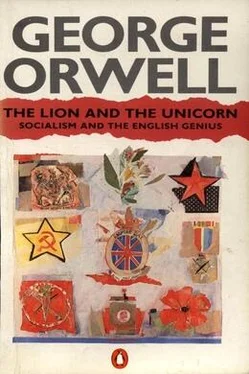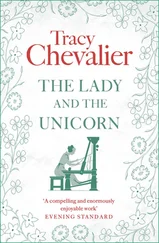But this has nothing to do with economic liberty, the right to exploit others for profit. It is the liberty to have a home of your own, to do what you like in your spare time, to choose your own amusements instead of having them chosen for you from above. The most hateful of all names in an English ear is Nosey Parker. It is obvious, of course, that even this purely private liberty is a lost cause. Like all other modern people, the English are in process of being numbered, labelled, conscripted, 'co–ordinated'. But the pull of their impulses is in the other direction, and the kind of regimentation that can be imposed on them will be modified in consequence. No party rallies, no Youth Movements, no coloured shirts, no Jew–baiting or 'spontaneous' demonstrations. No Gestapo either, in all probability.
But in all societies the common people must live to some extent against the existing order. The genuinely popular culture of England is something that goes on beneath the surface, unofficially and more or less frowned on by the authorities. One thing one notices if one looks directly at the common people, especially in the big towns, is that they are not puritanical. They are inveterate gamblers, drink as much beer as their wages will permit, are devoted to bawdy jokes, and use probably the foulest language in the world. They have to satisfy these tastes in the face of astonishing, hypocritical laws (licensing laws, lottery acts, etc. etc.) which are designed to interfere with everybody but in practice allow everything to happen. Also, the common people are without definite religious belief, and have been so for centuries. The Anglican Church never had a real hold on them, it was simply a preserve of the landed gentry, and the Nonconformist sects only influenced minorities. And yet they have retained a deep tinge of Christian feeling, while almost forgetting the name of Christ. The power–worship which is the new religion of Europe, and which has infected the English intelligentsia, has never touched the common people. They have never caught up with power politics. The 'realism' which is preached in Japanese and Italian newspapers would horrify them. One can learn a good deal about the spirit of England from the comic coloured postcards that you see in the windows of cheap stationers' shops. These things are a sort of diary upon which the English people have unconsciously recorded themselves. Their old–fashioned outlook, their graded snobberies, their mixture of bawdiness and hypocrisy, their extreme gentleness, their deeply moral attitude to life, are all mirrored there.
The gentleness of the English civilization is perhaps its most marked characteristic. You notice it the instant you set foot on English soil. It is a land where the bus conductors are good–tempered and the policemen carry no revolvers. In no country inhabited by white men is it easier to shove people off the pavement. And with this goes something that is always written off by European observers as 'decadence' or hypocrisy, the English hatred of war and militarism. It is rooted deep in history, and it is strong in the lower–middle class as well as the working class. Successive wars have shaken it but not destroyed it. Well within living memory it was common for 'the redcoats' to be booed at in the streets and for the landlords of respectable public houses to refuse to allow soldiers on the premises. In peace time, even when there are two million unemployed, it is difficult to fill the ranks of the tiny standing army, which is officered by the county gentry and a specialized stratum of the middle class, and manned by farm labourers and slum proletarians. The mass of the people are without military knowledge or tradition, and their attitude towards war is invariably defensive. No politician could rise to power by promising them conquests or military 'glory', no Hymn of Hate has ever made any appeal to them. In the last war the songs which the soldiers made up and sang of their own accord were not vengeful but humorous and mock–defeatist. [1]The only enemy they ever named was the sergeant–major.
In England all the boasting and flag–wagging, the 'Rule Britannia' stuff, is done by small minorities. The patriotism of the common people is not vocal or even conscious. They do not retain among their historical memories the name of a single military victory. English literature, like other literatures, is full of battle–poems, but it is worth noticing that the ones that have won for themselves a kind of popularity are always a tale of disasters and retreats. There is no popular poem about Trafalgar or Waterloo, for instance. Sir John Moore's army at Corunna, fighting a desperate rearguard action before escaping overseas (just like Dunkirk!) has more appeal than a brilliant victory. The most stirring battle–poem in English is about a brigade of cavalry which charged in the wrong direction. And of the last war, the four names which have really engraved themselves on the popular memory are Mons, Ypres, Gallipoli and Passchendaele, every time a disaster. The names of the great battles that finally broke the German armies are simply unknown to the general public.
The reason why the English anti–militarism disgusts foreign observers is that it ignores the existence of the British Empire. It looks like sheer hypocrisy. After all, the English have absorbed a quarter of the earth and held on to it by means of a huge navy. How dare they then turn round and say that war is wicked?
It is quite true that the English are hypocritical about their Empire. In the working class this hypocrisy takes the form of not knowing that the Empire exists. But their dislike of standing armies is a perfectly sound instinct. A navy employs comparatively few people, and it is an external weapon which cannot affect home politics directly. Military dictatorships exist everywhere, but there is no such thing as a naval dictatorship. What English people of nearly all classes loathe from the bottom of their hearts is the swaggering officer type, the jingle of spurs and the crash of boots. Decades before Hitler was ever heard of, the word 'Prussian' had much the same significance in England as 'Nazi' has today. So deep does this feeling go that for a hundred years past the officers of the British army, in peace time, have always worn civilian clothes when off duty.
One rapid but fairly sure guide to the social atmosphere of a country is the parade–step of its army. A military parade is really a kind of ritual dance, something like a ballet, expressing a certain philosophy of life. The goose–step, for instance, is one of the most horrible sights in the world, far more terrifying than a dive–bomber. It is simply an affirmation of naked power; contained in it, quite consciously and intentionally, is the vision of a boot crashing down on a face. Its ugliness is part of its essence, for what it is saying is 'Yes, I am ugly, and you daren't laugh at me', like the bully who makes faces at his victim. Why is the goose–step not used in England? There are, heaven knows, plenty of army officers who would be only too glad to introduce some such thing. It is not used because the people in the street would laugh. Beyond a certain point, military display is only possible in countries where the common people dare not laugh at the army. The Italians adopted the goose–step at about the time when Italy passed definitely under German control, and, as one would expect, they do it less well than the Germans. The Vichy government, if it survives, is bound to introduce a stiffer parade–ground discipline into what is left of the French army. In the British army the drill is rigid and complicated, full of memories of the eighteenth century, but without definite swagger; the march is merely a formalized walk. It belongs to a society which is ruled by the sword, no doubt, but a sword which must never be taken out of the scabbard.
Читать дальше












